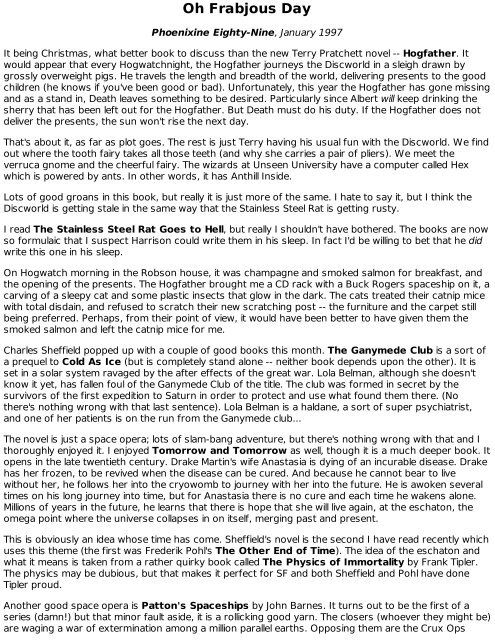Triffids Beard 2 - The Bearded Triffid
Triffids Beard 2 - The Bearded Triffid
Triffids Beard 2 - The Bearded Triffid
You also want an ePaper? Increase the reach of your titles
YUMPU automatically turns print PDFs into web optimized ePapers that Google loves.
Oh Frabjous Day<br />
Phoenixine Eighty-Nine, January 1997<br />
It being Christmas, what better book to discuss than the new Terry Pratchett novel -- Hogfather. It<br />
would appear that every Hogwatchnight, the Hogfather journeys the Discworld in a sleigh drawn by<br />
grossly overweight pigs. He travels the length and breadth of the world, delivering presents to the good<br />
children (he knows if you've been good or bad). Unfortunately, this year the Hogfather has gone missing<br />
and as a stand in, Death leaves something to be desired. Particularly since Albert will keep drinking the<br />
sherry that has been left out for the Hogfather. But Death must do his duty. If the Hogfather does not<br />
deliver the presents, the sun won't rise the next day.<br />
That's about it, as far as plot goes. <strong>The</strong> rest is just Terry having his usual fun with the Discworld. We find<br />
out where the tooth fairy takes all those teeth (and why she carries a pair of pliers). We meet the<br />
verruca gnome and the cheerful fairy. <strong>The</strong> wizards at Unseen University have a computer called Hex<br />
which is powered by ants. In other words, it has Anthill Inside.<br />
Lots of good groans in this book, but really it is just more of the same. I hate to say it, but I think the<br />
Discworld is getting stale in the same way that the Stainless Steel Rat is getting rusty.<br />
I read <strong>The</strong> Stainless Steel Rat Goes to Hell, but really I shouldn't have bothered. <strong>The</strong> books are now<br />
so formulaic that I suspect Harrison could write them in his sleep. In fact I'd be willing to bet that he did<br />
write this one in his sleep.<br />
On Hogwatch morning in the Robson house, it was champagne and smoked salmon for breakfast, and<br />
the opening of the presents. <strong>The</strong> Hogfather brought me a CD rack with a Buck Rogers spaceship on it, a<br />
carving of a sleepy cat and some plastic insects that glow in the dark. <strong>The</strong> cats treated their catnip mice<br />
with total disdain, and refused to scratch their new scratching post -- the furniture and the carpet still<br />
being preferred. Perhaps, from their point of view, it would have been better to have given them the<br />
smoked salmon and left the catnip mice for me.<br />
Charles Sheffield popped up with a couple of good books this month. <strong>The</strong> Ganymede Club is a sort of<br />
a prequel to Cold As Ice (but is completely stand alone -- neither book depends upon the other). It is<br />
set in a solar system ravaged by the after effects of the great war. Lola Belman, although she doesn't<br />
know it yet, has fallen foul of the Ganymede Club of the title. <strong>The</strong> club was formed in secret by the<br />
survivors of the first expedition to Saturn in order to protect and use what found them there. (No<br />
there's nothing wrong with that last sentence). Lola Belman is a haldane, a sort of super psychiatrist,<br />
and one of her patients is on the run from the Ganymede club...<br />
<strong>The</strong> novel is just a space opera; lots of slam-bang adventure, but there's nothing wrong with that and I<br />
thoroughly enjoyed it. I enjoyed Tomorrow and Tomorrow as well, though it is a much deeper book. It<br />
opens in the late twentieth century. Drake Martin's wife Anastasia is dying of an incurable disease. Drake<br />
has her frozen, to be revived when the disease can be cured. And because he cannot bear to live<br />
without her, he follows her into the cryowomb to journey with her into the future. He is awoken several<br />
times on his long journey into time, but for Anastasia there is no cure and each time he wakens alone.<br />
Millions of years in the future, he learns that there is hope that she will live again, at the eschaton, the<br />
omega point where the universe collapses in on itself, merging past and present.<br />
This is obviously an idea whose time has come. Sheffield's novel is the second I have read recently which<br />
uses this theme (the first was Frederik Pohl's <strong>The</strong> Other End of Time). <strong>The</strong> idea of the eschaton and<br />
what it means is taken from a rather quirky book called <strong>The</strong> Physics of Immortality by Frank Tipler.<br />
<strong>The</strong> physics may be dubious, but that makes it perfect for SF and both Sheffield and Pohl have done<br />
Tipler proud.<br />
Another good space opera is Patton's Spaceships by John Barnes. It turns out to be the first of a<br />
series (damn!) but that minor fault aside, it is a rollicking good yarn. <strong>The</strong> closers (whoever they might be)<br />
are waging a war of extermination among a million parallel earths. Opposing them are the Crux Ops


